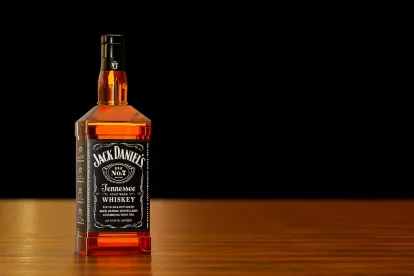The United States Supreme Court unanimously sided with Jack Daniel’s in a trademark infringement dispute with dog toy manufacturer VIP Products over a poop-themed, chewy dog toy, in Jack Daniel’s Properties, Inc. v. VIP Products LLC, 599 U.S. ___ (2023). Justice Elena Kagan, who authored the opinion, noted that whiskey and a dog toy are two items that rarely appear in the same sentence together.
Jack Daniel’s owns trademarks related to their Tennessee Whiskey, specifically, for the shape of the bottle and for many of the words and markings on the bottle. VIP sells a “Bad Spaniels” vinyl dog toy, which is shaped like a Jack Daniel’s whiskey bottle and features terms and markings spoofing Jack Daniel’s. VIP also claimed trademark rights in its terms and markings. The spoofed markings on the dog toy were placed similarly to those on the Jack Daniel’s whiskey bottle. For example, the dog toy included “Bad Spaniels” in an arched orientation similar to “Jack Daniel’s,” followed by the term “The Old No. 2 on Tennessee Carpet” similar to “Old No. 7 Tennessee Whiskey.”
Jack Daniel’s argued that the dog toy infringes Jack Daniel’s trademark and trade dress rights and dilutes its trademark rights by associating its whiskey with dog poop. VIP argued that its product is an “expressive work” that is subject to the threshold Rogers test developed by the Second Circuit, which is designed to protect First Amendment interests in the trademark context, and as a result, the “likelihood of confusion” standard was irrelevant. VIP further argued that Bad Spaniels does not dilute Jack Daniel’s trademark rights because Bad Spaniels is a parody and therefore a “fair use” of the famous mark.
The Supreme Court reasoned that the Rogers test does not apply when an alleged infringer is using a trademark to designate the source for the infringer’s own goods. Because VIP was claiming trademark and trade dress rights in its own product, the trademark and trade dress were being used as source identifiers. The dog toy was not an expressive work and, as a result, the Rogers test was not applicable. Rather, the issue that must be determined is whether there was a likelihood of consumer confusion about the source of the goods.
With respect to parody, the Supreme Court similarly reasoned that the Lanham Act exclusion shielding use of a mark for parody, criticism, or commentary is not applicable when the allegedly infringing mark is itself used as a designation of source for its own goods or services.
The Supreme Court ultimately sided with Jack Daniel’s and vacated the Ninth Circuit judgment in favor of VIP. The case was remanded to the lower court for a determination on the likelihood of confusion.





 />i
/>i

